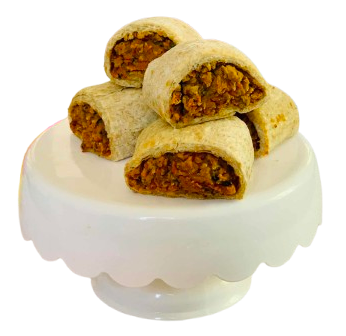This is Part 3 of our special story to mark Food Allergy Week 2024. Follow one family’s 14-year journey of managing allergies and food-related autoimmune disease – including how it changes as child morphs into teenager. Read Part 1 and Part 2 first.
PART 3: Social impacts, eating out & teen transition
Managing a peanut allergy and coeliac disease has changed as Edie has grown – and our own control and influence wanes. At childcare and primary school, we had personal contact with teachers in a much smaller environment. At high school, we are handing the reins to increasingly independent adolescent.
Of course, teens have to balance the desire to fit in with the willingness they need to ask questions and stay safe – but we are lucky. Edie was diagnosed young and appreciates the health benefits. We trust her confidence, knowledge and intuition. Here are some of the ongoing challenges, for her and us.
Social situations
We’ve always walked a fine line of protecting Edie while trying not to be “too demanding”. For catch-ups and gatherings, we always emphasise her peanut allergy, given the life-threatening risk. When it comes to her coeliac needs, we will usually take snacks and meals to ensure she has something to eat. Cross-contamination can be tricky to manage without experience and we don’t want to overburden our hosts.
We have very close friends who have educated themselves about Edie’s dietary needs – and we can relax at their house, no questions asked. Everything they serve is safe for everyone, included Edie, and it is bliss. Her grandparents and other family always ensure an abundance of GF treats when we visit. It makes her smile and feel included.
For primary school birthday parties, we would advise her allergies (especially peanuts), but tell the hosts not to worry about providing GF food. We prepared her own little party pack, making it easier and safer for everyone – and Edie was happy as long as lollies were involved. Teen birthday parties are different – and party packs are way too embarrassing. For a casual party at a friend’s home, Edie eats in advance. We’re also facing a new chapter of “restaurant parties” with friends (and without parents), and we always call to check the venue. Edie has practiced how to talk to restaurant staff and ask the right questions.
School camps
School camps demand pre-planning and communication. We check their understanding of allergies and coeliac disease as well as their specific preparation, cooking and serving processes. Depending on the camp’s track record and our confidence, we provide plenty of back-up snacks or fully cater for Edie by packing meals. We have many conversations with her, so she feels confident to advocate for herself. Again, Allergy & Anaphylaxis has a fantastic checklist.
Eating out & travelling
When it comes to choosing restaurants, we check Facebook groups dedicated to people with coeliac disease for “tried and tested” recommendations, as well as the list of restaurants accredited by Coeliac Australia. Unless a restaurant is entirely gluten and/or peanut free – a rare but wonderful treat – there is always a conversation.
We usually phone in advance, and check again when we arrive. We make Edie’s dietary needs very clear and ask questions like: “Is there a separate prep area and dedicated fryer for gluten-free food?” and “Do you use peanut oil in cooking?”. We know and accept that most venues can’t provide 100% guarantees. However, our well-honed instincts quickly tell us if there are processes in place to minimise risks.
When planning holidays, we save time and frustration by researching a list of eating-out options before we go. For now, we have ruled out many destinations where food standards or language barriers pose excess risks or stress.
Positives and the future
As she grows, there will be new considerations for Edie: including part-time jobs, alcohol, dating, and travelling to more far-flung destinations. But there are many reasons to be optimistic. Promising research and clinical trials are underway to improve peanut allergy treatment. Researchers are also working to improve detection, management and treatment of coeliac disease. The options for a delicious and nutritious gluten-free diet (both cooking and dining out) are growing every day.
Edie thrived after her coeliac disease diagnosis. Her small intestine healed and she grew tall, fit and strong. All subsequent blood tests confirm she’s maintaining an excellent gluten-free diet and her antibodies have returned to normal. This is monitored regularly to check for accidental exposure or damage. We’re grateful for the people who have supported Edie over the years – without making her feel different or somehow inferior. So many school buddies and educators have been her protectors and supporters. And we know we are very lucky. Many people live with conditions and illnesses that are far more complex and challenging.
What gives us the most reassurance is Edie’s resilience throughout this whole adventure. She quietly manages the complications and restrictions. She often watches other kids enjoy food she can’t have (albeit with the promise of a yummy alternative later). It can be disappointing and annoying at times – but she maintains a positive attitude. And she has gradually learned how to become her own advocate, which is the most heartening thing of all.
At The Wellbeing Food Co, we specialise in helping clients navigate multiple allergies, intolerances and culturally-sensitive dietary needs. Special meals are individually sealed and labelled to eliminate guesswork and cross-contamination risk. Because every child deserves great food – and providers and parents deserve certainty, every day.
Want to improve your management of allergies and dietary needs? Read more here or call us today.



Comments are closed